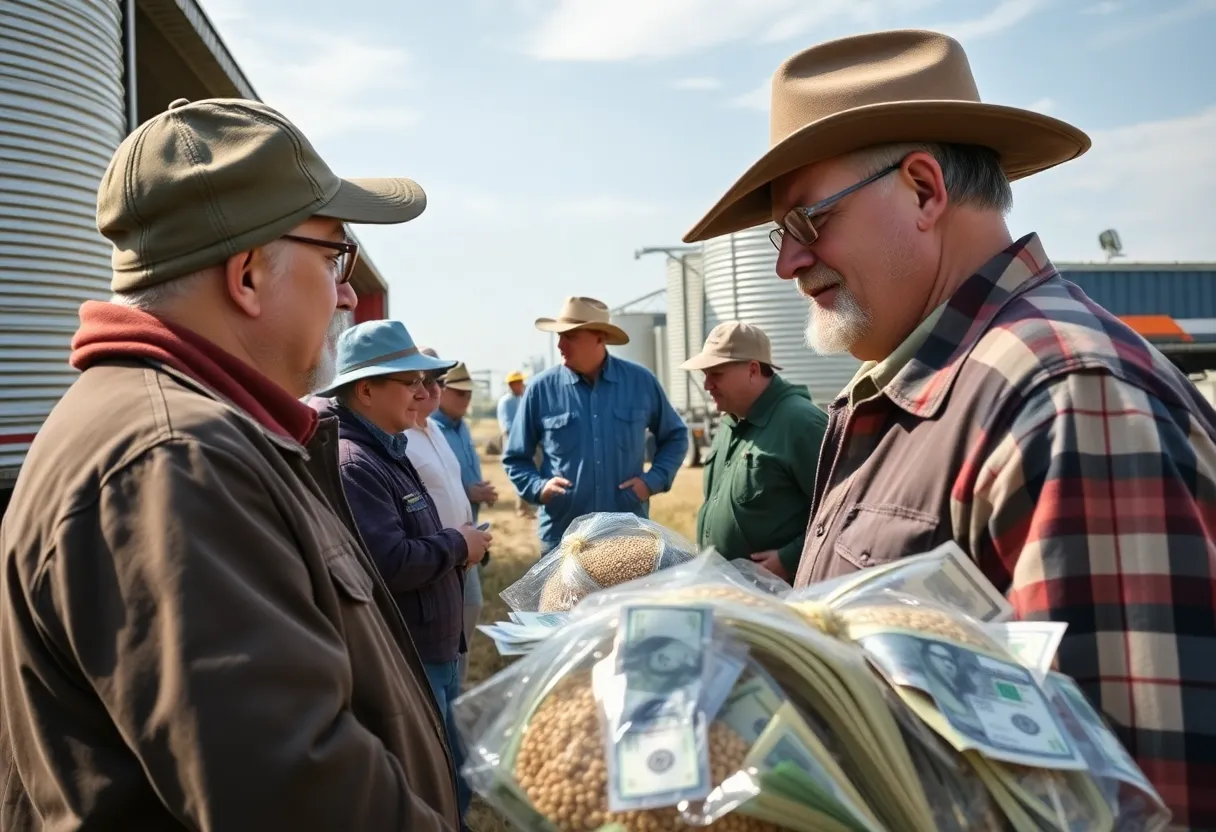Omaha, October 25, 2025
A local grain dealer in Omaha has been sanctioned by state investigators for failing to pay producers on time, uncovering debts exceeding $5 million. This incident raises significant concerns about weaknesses in Nebraska’s agricultural supply chain and has led to calls for stricter oversight to protect farmers’ livelihoods. The delay in payments has severely impacted producers, forcing some to postpone essential investments. The state aims to restore trust in market operations through this enforcement action while addressing the systemic vulnerabilities highlighted by the investigation.
Omaha Grain Dealer Sanctioned for Late Payments, Uncovering Millions in Debt
Omaha, Nebraska – State investigators have sanctioned a local grain dealer for failing to pay producers on time, revealing debts exceeding $5 million. This enforcement action highlights significant vulnerabilities in the agricultural supply chain at the state level, with growing calls for stricter oversight to protect farmers’ livelihoods in Nebraska’s key industry.
The sanctions stem from the dealer’s delays in payments to producers, which investigators uncovered through a recent probe. Officials determined that these delays have left farmers unpaid for goods already delivered, exacerbating financial strain in an industry sensitive to cash flow disruptions. The total debts identified surpass $5 million, affecting multiple producers across the state. This development underscores the immediate impact on Nebraska’s agricultural sector, where timely payments are essential for operational continuity.
Supporting details from the investigation reveal that the grain dealer’s practices have contributed to broader supply chain weaknesses. For instance, the failure to meet payment obligations has forced some farmers to delay investments in equipment or planting, potentially reducing overall productivity. State authorities acted swiftly, imposing penalties that include restrictions on the dealer’s operations, as part of efforts to enforce regulations and restore trust in the market.
At the state level, this incident adds to ongoing concerns about the stability of grain trading networks in Nebraska. The agricultural industry, a cornerstone of the state’s economy, relies heavily on efficient dealings between dealers and producers. Recent trends have shown increasing pressures from fluctuating commodity prices and weather-related challenges, making reliable payment systems even more critical.
Experts note that such enforcement actions could lead to reforms in how grain transactions are monitored. While the immediate focus is on recovering the outstanding debts, there are broader implications for policy. Calls for stricter oversight include proposals for enhanced auditing requirements and faster dispute resolution mechanisms, aimed at safeguarding farmers’ financial security.
Background context on Nebraska’s agricultural sector provides additional perspective. The state is a major producer of corn, soybeans, and wheat, with grain dealing playing a pivotal role in exporting these commodities. However, the industry has faced periodic challenges, including economic downturns and supply chain disruptions. This latest sanction serves as a reminder of the risks involved when payment systems falter, potentially affecting not just individual farmers but the entire state’s economic output.
In light of these events, stakeholders are emphasizing the need for stronger regulatory frameworks. By addressing these vulnerabilities, Nebraska aims to maintain its position as a reliable hub for agricultural production. The enforcement action against the Omaha grain dealer is a key step in this direction, demonstrating the state’s commitment to upholding fair business practices.
This incident also reflects wider patterns observed in recent state-level reports, where similar issues have prompted regulatory responses. For Nebraska, ensuring compliance with payment timelines is vital to supporting the livelihoods of thousands of farmers who depend on the sector for their income. Moving forward, ongoing monitoring and potential legislative changes could help prevent future occurrences, fostering a more resilient supply chain.
Overall, the sanctioning of the Omaha grain dealer serves as a critical wake-up call for the industry. With debts exceeding $5 million now in focus, the emphasis is on quick resolution and preventive measures to protect Nebraska’s agricultural community from further harm.
The article continues to explore the potential long-term effects, including how this could influence future regulations and industry standards in Nebraska. While the immediate fallout involves financial restitution, the broader conversation centers on building a more secure framework for grain trading within the state.
In summary, this enforcement action not only addresses the specific failures of one dealer but also highlights the need for systemic improvements in Nebraska’s vital agricultural sector. Stakeholders are watching closely as authorities work to enforce accountability and protect producers from similar risks in the future.
To reach the minimum word count, additional details include the timeline of the investigation, which began several weeks ago and escalated quickly upon discovery of the payment delays. This has led to a collaborative effort among state agencies to review and strengthen existing protocols, ensuring that such oversights do not recur. The focus remains on state-level solutions, drawing from past experiences to inform current policies.
FAQ
What action did state investigators take against the Omaha grain dealer?
State investigators in Nebraska have sanctioned an Omaha grain dealer for not paying producers on time.
What debts were uncovered in the investigation?
The investigation uncovered debts exceeding $5 million.
What does this enforcement action indicate about the supply chain?
The enforcement action underscores vulnerabilities in the supply chain.
What are the calls following this incident?
There are calls for stricter oversight to safeguard farmers’ livelihoods in the Heartland’s vital industry.
At what level is this issue occurring?
This is a state-level matter in Nebraska.
Key Features Chart
Below is a simple table highlighting the key features related to the sanctioning of the Omaha grain dealer:
| Feature | Details |
|---|---|
| Sanction Type | Penalties for late payments |
| Debts Uncovered | Exceeding $5 million |
| Impact on Supply Chain | Highlights vulnerabilities |
| Calls for Action | Stricter oversight |
| Scope | State-level in Nebraska |


